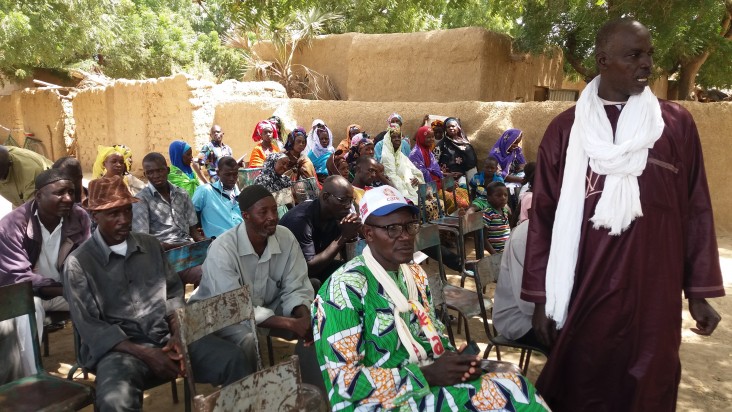Speeches Shim

" From now on, I will get involved as much as I can and will work with the school management committee to stop the early marriage practice in my commune." Madou Coulibaly
February 2019— Poverty, early marriage and pregnancy – these are just a few of the barriers that girls face in Mali when if comes to getting an education. But in places like the Niono area of Ségou region, leaders in the community are taking an active stand against the socio-cultural factors that frequently keep girls out of school.
Madou Coulibaly is the Imam of the local mosque in Niono, and these days he sees the importance of helping parents and communities understand that boys and girls should be given the same educational opportunities. He is just one of local religious leaders who has participated in community dialogues fostered by USAID’s Emergency Education Support Activity (EESA).
“In our area, the religious leaders have always lacked courage to tell parents that the early marriage of girls does not rhyme with Islam,” explains Imam Madou Coulibaly. “Moreover, we sadly recognize that early marriage is not the correct solution to what parents most fear, which is instability in their girls’ lives. In fact, many of these young girls abandon their husband in first few years and suffer greatly because of that.”
EESA has organized community mobilization activities to support girls’ enrollment and attendance in school – mainly dialogues, which bring together village councilors, religious leaders, members of school associations, youth, teachers, parents’ associations and school administrators to discuss the importance of girls’ education. Though questions and discussion, many community members come to realize the importance of education and the impact that the cultural practices have on girls’ education.
The EESA community dialogue activities have been held in the 250 targeted schools in the regions of Segou, Mopti, Timbuktu, Gao and Kidal, and over 13,500 people, including 5,833 women, participated in the dialogues. Community interest has been high, with most of the communities where EESA is active, including Niono, signing agreements to ensure that girls receive the same education as boys.
In October 2017, Madou Coulibaly started accompanying the local school management committee on a door- to-door sensitization campaign in the neighborhood to encourage parents to enroll their daughters in school. As a result, the local school of Djenné Coura enrolled 273 students, including 110 girls, up from 93 girls the year before. Madou Coulibaly acknowledges that his work is far from over. “I will get involved as much as I can,” he says. “I will work with the school management committee to stop the early marriage practices in my area.”
The Education Emergency Support Activity (EESA) focuses on rapid return to school for children. This three-year project (2016-2018) has contributed to increasing equitable access to basic education for 102.604 Malian children, including 49,477 girls in conflict-affected regions of Mali.

Comment
Make a general inquiry or suggest an improvement.